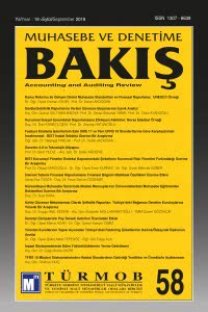ENTELEKTÜEL SERMAYENİN HESAPLANMASINDA MUHASEBE BİLGİ SİSTEMİNİN KATKISI: Katılım Bankalarında Bir Uygulama
Bu çalışmanın amacı, entelektüel sermayenin hesaplanmasında muhasebe bilgi sisteminin rolünü ortaya koymaktır. Çalışmanın temel çıkış noktası, işletme entelektüel sermayesinin işletme muhasebe servisi tarafından finansal tablolara yansıtılıp yansıtılmadığının araştırılmasıdır. Çalışmanın teorik çerçevesinde entelektüel sermaye vemuhasebe bilgi sistemi hakkında ayrıntılı bilgi verilmiştir. Uygulama bölümünde ise ülkemizde faaliyet gösterenKatılım Bankalarının muhasebe servisinin ve ürettiği bilgilerin entelektüel sermaye hesaplamasına etkisi bir anket uygulaması ile ölçülmeye çalışılmıştır
Anahtar Kelimeler:
Entelektüel sermaye, entelektüel sermaye unsurları, entelektüel sermaye hesaplama yöntemleri, muhasebe bilgi sistemi
CONTRIBUTION OF ACCOUNTING INFORMATION SYSTEM ON CALCULATING INTELLECTUAL CAPITAL: A Applıcatıon In Katılım Banks
While intellectual capital is been calculating; mentioning the important role of accounting information systemis order of this working. The basic exit point of working is searching the situation, if capital of intellectual administrating is been reflected to financial tables by service of accounting administrating or not. In order to criticizing this subject; intellectual capital should be understood and should be explained sufficiently. In the theorical frame of working; The information about intellectual capital and accounting information system is givenclosely. Moreover, In the aplication stage; The effects of accounting services and information produced by Bankof Katılım, which is appeared in our country, on intellectual capital is tried to be measured by survey application
Keywords:
Intellectual capital, elements of intellectual capital, the way of calculating intellectual capital, accounting information system,
___
- ACAR, D., H.DALGAR, “Entelektüel Sermayenin Ölçülmesinde Muhasebe Bilgi Sisteminin Katkısı,” Muhase- be ve Denetime Bakış Dergisi, s.23-40, Ocak 2005.
- ARGÜDEN, Y., K. JACOBSEN, P. HOFMAN-BANG ve B. AKAR KUYUCU, Entelektüel Sermaye, Ar-Ge Danışmanlık Yayınları No:7, 2005.
- BENİTA, C., “Accountability Lost: The Rise and Fall of Double Entry”, Omega The International Journal of Management Science, Vol 31, Issue 4, August 2003.
- BROOKING, A., Intellectual Capital: Core Asset for The Third Millenium Enterprise, International Thom- son Business Press, 1998.
- ERCAN, M. K, M. B. ÖZTÜRK, K.DEMİRGÜNEŞ, Değere Dayalı Yönetim ve Entelektüel Sermaye, Gazi Kitapevi, Ankara, 2003.
- KALAYCI, Ş. SPSS Uygulamalı Çok Değişkenli İstatistik Teknikleri, Asil Yayın Dağıtım Ltd. Şti., Ankara, KARACAN, S., Entelektüel Sermayenin Muhasebeleştirilmesi ve Finansal Tablolarda Sunulması, Orient Yayınları, Ankara, 2007.
- NAPAHIET, L., S.GHOSHAL, S, Social Capital, Intellectual Capital and The Creation of Value in Firms, Academy Management Proceedings, 1997.
- ÖMÜRBEK, V., Kurumsal Kaynak Planlamasında Muhasebe Bilgi Sisteminin Rolü : Gıda Sektöründe Uy- gulama, Doktora Tezi, Süleyman Demirel Üniversitesi, Sosyal Bilimler Enstitüsü , Isparta, 2003.
- PENA, I., Intellectual Capital and Business Start-up Success, Journal of Intellectual Capital, Vol. 3 No. 2., ROMNEY, M.B., P.J.STEİNBART, Accounting Information Systems, Prentice Hall, NewJersey, 2000.
- STEWART, T. A., Entelektüel Sermaye Kuruluşların Yeni Zenginliği, Kontent Kitap, İstanbul, 2000.
- SÜRMELİ, F., Muhasebe Bilgi Sistemi, Anadolu Üniversitesi Yayınları, Eskişehir, 2005.
- ŞAMİLOĞLU, F., Entelektüel Sermaye, Gazi Kitabevi, Ankara, 2002.
- The Accounting Information System, http://ddl.uwinnipeg.calfin_acct/files/chapternotes/ chptr3.pdf.
- ISSN: 1307-6639
- Yayın Aralığı: Yılda 3 Sayı
- Başlangıç: 2000
- Yayıncı: TÜRMOB
Sayıdaki Diğer Makaleler
KURUMSAL YÖNETİŞİMİN İŞLETMELERİN KREDİ NOTLARI ÜZERİNE ETKİSİ: BASEL II PERSPEKTİFİNDEN BİR BAKIŞ
Hasan İBİCİOĞLU, Hüseyin DALĞAR, Murat KAYA
FİNANSAL TABLOLARIN YAYIMININ ONAYLANMA SÜRECİ VE BU SÜREÇTEKİ GELİŞMELERİN TABLOLARA YANSITILMASI
BİLGİSAYARLI MUHASEBE DERSİNİN BMD ÜRETİM ETKİNLİĞİNE İLİŞKİN ÖLÇEĞİN GELİŞTİRİLMESİ VE BİR UYGULAMA
